
Photo from article: "Why Are So Many Girls Lesbian or Bisexual?"
From: Psychology Today, April 3, 2010
By: Leonard Sax, M.D., Ph.D.
These look just like the "college best friends" I write about below
Camille Paglia would be intrigued, and horrified, at this epidemiology of young lesbians, cheerfully "coming out."
Ellen Page
A few days ago, a young and pretty Canadian actress, Ellen Page, declared herself to be a closeted lesbian, that is until that moment when she dramatically announced to whomever bothered to listen: I am gay. She's twenty-six years old at this announcement, but according to her testimony, had been "gay" for years.
I found her video on New York Post's online magazine. It was hard to miss on the side column, with a large photo of her, and the headline: Tired of Hiding: Actress Ellen Page Comes Out as Gay.
Page is claiming that her "coming out" is "a personal obligation and a social responsibility [direct quote from the Youtube video here around the 6:15 minute point]", and is otherwise a "traumatic event."
It is interesting to see that "coming out" in the 21st century is such a traumatic event. I thought we had taken care of stigmatizing gays and had built such a "gay-friendly" world that people were declaring their "true selves" left and right.
Well, not so, apparently. Page tearfully declares: "I suffered for years because I was scared to be 'out'." Didn't Ellen DeGeneres, pernicious model for this young Ellen, present us with her "secret" in a similarly tearful declaration seventeen years ago? Her career hasn't diminished one bit, and in fact has climbed since then.
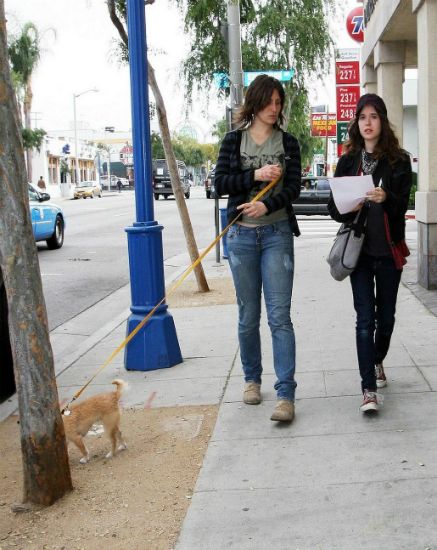
Page with "girlfriend"
Page was brought up in Eastern Canada, in Nova Scotia. Her parents divorced when she was very young, and her father remarried. She lived with her mother. At about fifteen, Page enrolled herself into a "Buddhist" school, with no academic structure, which emphasized "the arts." And her parents let her do this! Divorce is hard on any child, but a structureless one must be harsh. And worse, letting a young teenager decide on her intellectual and spiritual development is bizarre and cruel.
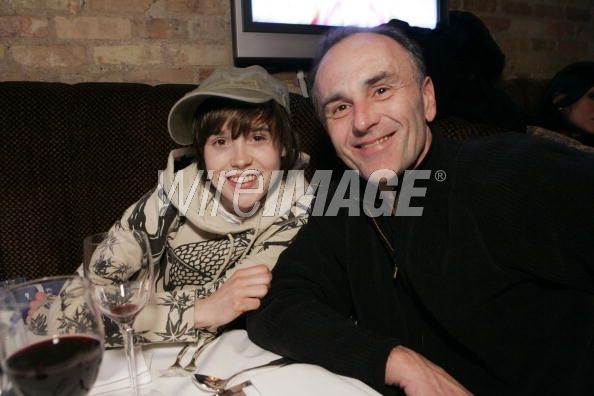
This is the best I could find of Page with her father.
Notice the impish quality of the father, who looks like he's out with his young son.
But then, what young boy would cling to his father like that?
Such is the ambiguous world of tomboys.
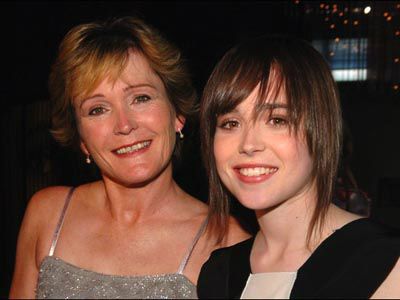
Page with her mother, looking dishevelled and tomboyish.
It looks like they were both out at some film premier,
where Page should be the star, but is upstaged
by her glamorous mother instead.
But homosexuality is still a social stigma, if "celebrities" have to make such a spectacle about their revelations. Normal, ordinary people, those that pay the films and shows to keep DeGeneres and Page in the business, will momentarily forget a gay person his abnormality as long as he entertains well. And if homosexuality is still a social stigma, despite all these efforts to normalize it, then it will always remain a social stigma.
And just in time for Obama's homosexual agenda of equality, the PBS program To The Contrary "for women, by women, about women" (my quotations), recently included on its panel an articulate black women, Danielle Moodie-Mills. I wondered who she was, with her caked make-up and twisted stringy hair.
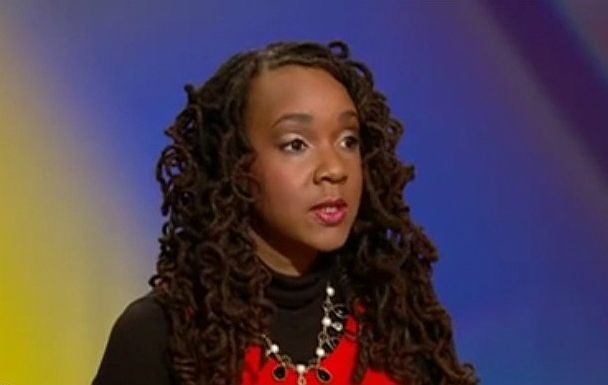
Moodie on the PBS program To The Contrary, which aired a couple of weeks ago
I found her profile all over the internet, since then. She is a black lesbian, whose "marriage" to another black woman was profiled in the black magazine Essence. They "married" in 2010, Mills at 32 and Moodie 31, and had "been together" for six years before that, which means they started this "relationship" when they were in their early twenties.
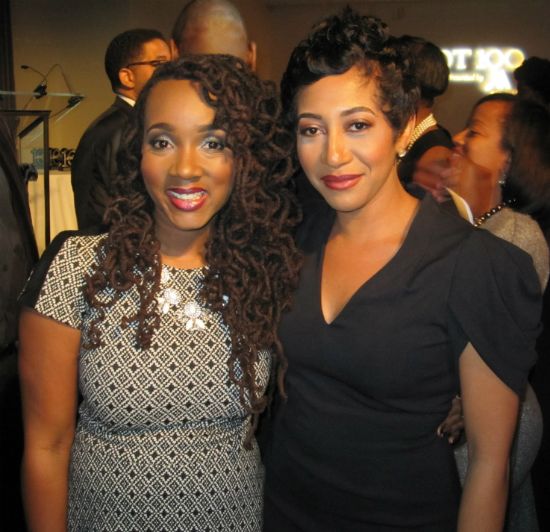
Danielle Moodie, on the right, is:
Advisor, LGBT Policy and Racial Justice
Center for American Progress
Nonprofit; 201-500 employees; Think Tanks industry
(LinkedIn Profile)
and Ayisha Millis is:
...a Senior Fellow and Director of the FIRE - Fighting Injustice to Reach Equality - Initiative at the Center for American Progress, where her work explores the intersections of race, class, and sexuality.
(Center for American Progress profile)
They both have those fluffy jobs just right for the Obama administration.
There must be dozens around of these "lesbians" around. Girls walking around the mall, chattering and laughing: are they "young lesbians"? Two young women eating in a restaurant, fancily dressed: are they on a date? A couple, women, picking up a young child at school or at a day care: are they "two mommies"? And so on.
I won't go into the pshychological, sociological, cultural, School of Camille Paglia, analyses of what I'm seeing here, so here's my take, at least on Page, Moodie and Mills.
There is very little information forthcoming from Moodie or Mills. I've gleaned what there is available from various websites and their limited profiles in their professional biographies.
Danielle Moodie
Danielle Moodie's only reference to her parentage (from searches around the web) is a photo of hers which appeared on Essence magazine's profile of her "marriage" to Mills. Here, she is standing with a white man, named as Michael Newton, with the caption:
Dance with my father:Below is the photograph:
Danielle’s dad Michael Newton was close to tears as he danced with his daughter on her momentous day.
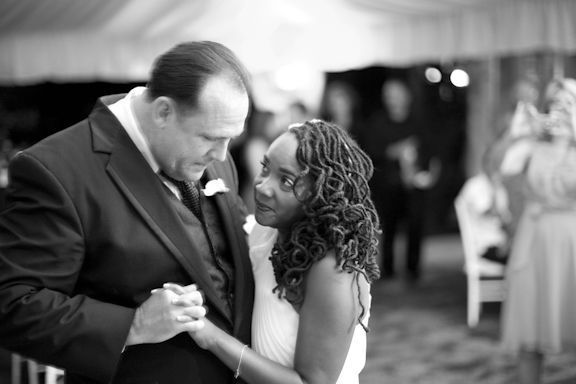
(Source: Essence)
I can only assume that she is adopted. Where is the mother (adoptee)? Why isn't she included in this wedding photograph? Is she white, black, other? What kind of life does Moodie live where she has to call a white man as her father? How hard was this for her as a young girl (assuming she was adopted young)? How much harder did it get as she became conscious of her surroundings? How did the "black identity" culture affect her identity? How does she relate to whites, and to the ominous White Male?
Aisha Mills
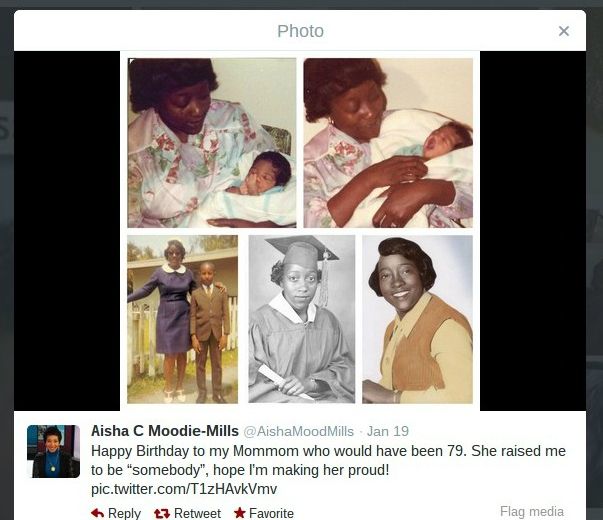
Mills posted this photo collage on her Twitter page
Mills was raised by her grandmother. She says: "My entire life, I have been a variety of 'others'." According to this post, her mother had "Asian" roots, but she was raised by her Black Southern Baptist grandparents, as the photos above indicate. The young, light-skinned boy in the photo collage could be her brother. Or is it her dressed in a suit and tie (as a young boy)? Yes! It is her, dressed as a young boy! So there you have it.
And here below, she is with her MIU (Missing in Upbringing) father at her "wedding."
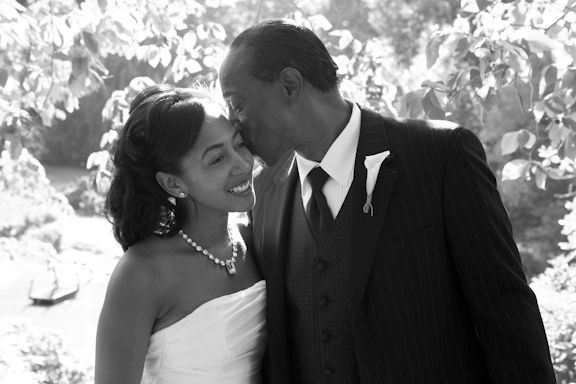
Source: Essence
Caption reads:
Proud Father
Aisha's father James Mills kisses his baby girl and wishes her well on her big day
The Mills-Moodie "elegant affair" of a wedding included baskets of chopsticks. The ominous absence of her Asian mother must make even the most mundane of Chinese objects into bouquets of roses.
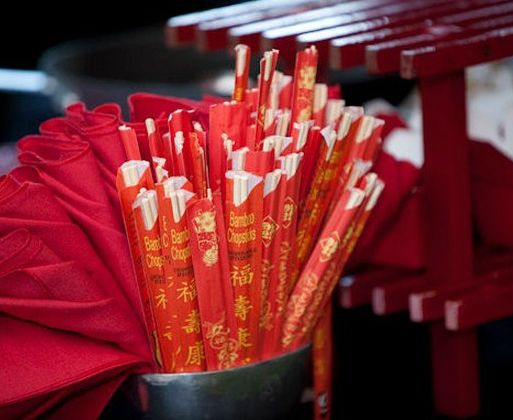
Chopstick elegance: Reaching for some ephemeral roots
Chopsticks, from the wedding album by Essence
The caption reads:
Cocktail Hour:
"The entire wedding was an elegant cocktail affair," Aisha explained.
------------------------------------------------------------------------------------------------------------------------------------------------------------
So what is it with these young women?
- A chaotic home life?
- A dearth of masculine young men?
- Feminism pushing young women into competitive and masculine roles, where they clash with young men, both the feminized ones, and those standing their ground and refusing to give in easily to a woman-centric environment?
- Black men, unavailable, either through their dropping out of society, their criminality, or their immaturity?
- Men refusing marriage, for fear of repercussions by feminism, and feminist women and wives?
- Men refusing to mature, and instead delaying marriage and family?
- The culture pushing, through mass media, that marriage is not necessary?
- Divorce rates, and divorce costs, high, especially (uniquely?) for men, so many opting out of marriage?
The "otherness" of the other becoming too much to deal with for young people these days, who are not used to natural competitions, and eventually some awe for differences.
- The desire by contemporary people to make everyone the same, to avoid this natural alienness or otherness of people?
- The desire to make everything "nice" and non-combative?
In any case, this "best friend" type of coupling is well suited for girls in college and high school. Under normal conditions, these girls will find staunch mothers or grandmothers who will diminish that seductive environment, give them the education they need, and place them in situations where they can lead a normal life, including building their future families.
The women I've described above are traumatized orphans, both in society and in family. They have been dealt with difficult beginnings. Since their families didn't come through for them, then it should have been up to the larger society to see that they didn't normalize their ambiguities and abnormalities. Now, as adults, they are seeped in their iniquities, and will only further terrorize society. Our job now is to see that they don't do that, and that they don't amass more vulnerable innocents along their way.
------------------------------------------------------------------------------------------------------------------------------------------------------------
Posted By: Kidist P. Asrat
------------------------------------------------------------------------------------------------------------------------------------------------------------
